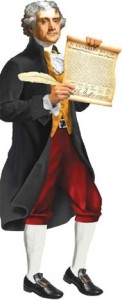Unions vs the People
by Tim Carney, Washington Examiner
Ed. Mr. Carney does make a reasonable case. The problem, of course, is that he is one sided. The issues n Wisconsin are not just whether the public unions are special interest groups. That is obviously true. The real problem is that Governor Walker is not only trying to get concessions in a financial sense, he is undermining democracy itself by trying to undermine the very existence of unions. Walker’s far right agenda goes further, he is also trying to undermine the model of shared governance on campus.
Tea party patriots, as well as the more rational conservatives like Mr. Carney, ought to note that a universal characteristic of ALL fascist states, has been an effort to outlaw unions.
Read on:
While liberal writers wax romantic about a workers’ uprising (former Labor Secretary Robert Reich wrote on Twitter “Wisconsin is spreading to Ohio — America’s microversion of Tunisia and Egypt. People are taking to the streets to get their rights”), what we’re really seeing is the labor movement acting as a wholly owned subsidiary of the Democratic Party.
Liberals and the White House try to blur the issue by lumping together government unions and labor unions in general. Obama wrongly calls Walker’s bill “an attack on unions.” It is, at its heart, a measure changing the way the state government procures labor — Walker would end single-source contracts with a politically connected special interests.
Government unions in Wisconsin perfectly match the definition of “special interests,” a term Obama often invokes. Four of the top six Wisconsin contributors to the 2010 elections were labor unions, with the state’s teachers union giving $119,342 and the Wisconsin chapter of the American Federation of State, County, and Municipal Employees spending $83,888. The teachers union gave 96 percent of its money to Democrats, while Wisconsin AFSCME gave Democrats every penny.
Government unions spent $573,868 on Wisconsin’s 2010 elections — almost all of it going to Democrats — while government employees spent another half million, with most going to Democrats.
Another characteristic of “special interests” is that they benefit at the expense of the public interest. Start with teachers unions that often work against students. Even setting aside the Wisconsin teachers abandoning their students last week in order to protest for higher pay and benefits, the teachers union has fought on the state level to interfere with Milwaukee’s trail-blazing school choice program, which is so popular that Democrats in 2009 voted to cap the number of enrollees.
And of course, there’s the budget question. Wisconsin has raised taxes in recent years, and is still facing a multibillion-dollar deficit. Other state programs are being trimmed, and Walker’s effort would be about spreading the pain — specifically shifting some of the government workers’ retirement contributions from taxpayers to the workers. If the government unions win, they guarantee more pain for everyone else, especially taxpayers.
In the romantic liberal vision of this union uprising, determined workers are standing up to the powerful. But there’s no fat-cat owner wanting to pocket more profits here. The unions’ target in Wisconsin is the taxpayer.
At bottom, this is the unions versus the people.
For much of the Left, though, this about protecting the power of labor. Again, this ignores the fundamental difference between public-sector unions and private-sector unions. Even Franklin Roosevelt said, “The process of collective bargaining, as usually understood, cannot be transplanted into the public service.”
As the Wall Street Journal pointed out, campaign contributions by government-sector unions, collected through mandatory dues, help elect the public officials who are then supposed to negotiate with them: “The unions sit, in effect, on both sides of the bargaining table.”
With this kind of leverage, it’s no wonder that unions are thriving in the public sector — only 6.9 percent of private-sector workers are unionized while 36.2 of government workers are. Moreover, as conservatives have long argued, when unions overreach in the private sector, they drive their employers out of business, and so unions only flourish under those employers — governments — that can’t go out of business.
While governments won’t go out of business, they are going broke. The electorate apparently now has an appetite for austerity, as evidenced by the Tea Party’s success, Chris Christie’s election in New Jersey, and Walker’s election in Wisconsin.
Obama has shown how the Democrats will play this: as an opportunity to rally the base and try to pump more money out of the unions that spent tens of millions of dollars to elect him. It could backfire if taxpayers see the likes of Walker as a rare grown-up under attack by opportunistic and utterly politicized unions populated by overpaid government workers.
It’s still unclear how Republicans will play this, though. Walker seems to be following the Christie model of standing up to the unions. Knowing Ohio Gov. John Kasich’s temperament, he’ll do the same. But will any GOP governors feel tempted to go the Arnold Schwarzenegger route of playing ball with the government unions?
With state budgets in crisis and the Democratic machinery already in all-out campaign mode, war has already been declared — and if the unions win, the people lose.
